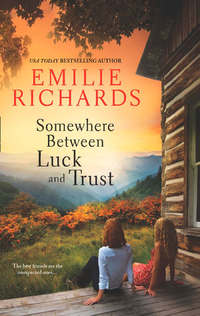
Полная версия
The Color Of Light
She continued on, talking next about the Levite, a man charged with both religious and political duties, who appeared after the priest and followed the same course.
“And finally comes the Samaritan. Since we aren’t living in ancient Israel let’s brush up on the Samaritans and why they were so disliked. One theory claims the Samaritans were the descendants of Joseph, one of the sons of Jacob, while the Jews were the descendants of another brother, Judah. So even though Samaritans and Jews may have been related, we know that family ties don’t always stand the test of time. Look at the Palestinians and the Jews today. Look at the Shiites and the Sunnis or the Catholics and the Protestants in places like Northern Ireland.”
As she let that sink in for a moment, a movement in the back of the sanctuary caught her eye. People came and went during services. Sometimes late arrivals slipped into pews in the back, and occasionally, during her more controversial sermons, people also slipped out, never to be seen again.
She doubted she had yet reached that tipping point today, and this time she didn’t really expect an exodus, just some pointed questions. As she’d guessed, the movement was caused by a late arrival.
The arrival was Shiloh, dressed in faded jeans and a thin T-shirt, who stood in the aisle at the back and gazed around, as if unsure what to do. Just as Analiese was afraid she would turn and leave, Shiloh spotted an empty space in a nearby pew, climbing over other churchgoers to get there and disappearing from sight behind a row of taller men.
In that instant Analiese reconsidered her sermon, but she really had no choice now but to finish it.
She drew herself up a little taller. “Over the centuries the histories of these close relatives diverged, and eventually each group believed that they alone possessed the truth and all the rights that go with it. Sounds familiar, doesn’t it? Today aren’t too many people sure they know exactly what’s right for everybody else?
“So what would you expect a Samaritan to do, coming upon a man, most probably a Jew, bleeding by the side of the road? Laugh? Taunt him? Even, perhaps, put the man out of his misery and consider his day well spent?”
She paused. “Of course, you would be wrong.”
She ended the story, explaining that the Samaritan, despite every historical and political reason not to, helped the stranger, binding his wounds, even finding him lodging and paying for it himself so that the injured man could recover.
“And so the story of the Good Samaritan ends. It’s a great tale with a happily-ever-after, isn’t it? But the most powerful part comes now. Because Jesus then asked the lawyer which of the three men who came upon the roadside victim acted as a true neighbor. Of course the lawyer had no choice but to answer, ‘the one who had mercy.’”
She let that sink in a moment before she went on. “Luke 10, verse 37, ends this way.” She opened her Bible again and read the final words, although she knew them well. “Jesus told him, ‘Go and do likewise.’”
She closed her Bible once more and looked out over the congregation. “I’ve told you a story that Jesus left us to ponder. Did this event take place?” She shrugged. “The story of the Good Samaritan is a parable, which means in many ways it’s a riddle for us to solve. Jesus told these stories to make us reconsider the way we live, to dig for meaning so we would remember more clearly. Jews of that time were used to parables. They understood that parables have multiple meanings and are not meant to be taken literally, because that would diminish their worth. We aren’t supposed to simply be happy the traveler was finally safe. We’re supposed to consider how he was saved, by whom and why it was important.”
She let her gaze drift over the congregation and saw, as she had expected, some puzzled faces. “You might be wondering why I chose this story on this particular day, when speaking on gratitude might have been more pleasant and certainly less challenging for Thanksgiving weekend. So let me tell you another story. Mine is not a parable. It happened this weekend right here in our church.”
She took a breath and began to tell the story of the Fowler family. She avoided as many personal details as she could, partly because Shiloh was sitting in the congregation and partly because that had been her intention all along. But she knew she had to make certain the congregation understand how desperate the Fowlers were.
“I want you to see that as your minister I made the initial decision to invite this family to stay overnight in the parish house apartment where our sexton and his family used to live. I didn’t have time to consult with anyone on the council. I also want you to know that I am not apologizing, because I would do it again, exactly the same way.”
She paused—for the last time, she hoped—to make sure they heard the next sentences clearly. “I did not want to be the priest in today’s parable. I wanted to be the Samaritan. I still do.
“The next morning our council executive committee agreed to allow the Fowler family to continue living in the apartment for two weeks while I try to find them more permanent housing and perhaps help with other issues. Some of you may have expertise that can help them settle into our community, and any assistance will be warmly welcomed.”
She moved on to statistics about homelessness, both nationwide and locally, particularly homeless families. Then she talked a little about the rally in which she had participated.
“Here’s what I know. It’s easy to go to rallies, even to stand on the stage and exhort a crowd to do their part. It’s easy to throw money at a problem and think we’ve done enough. But putting ourselves in the place of people just like us, who, often through no fault of their own, have ended up on the street? That’s never easy. Because it brings the wolves right to our doorsteps, doesn’t it? You, too, might be one paycheck from setting up a tent on a quiet green space or sleeping in a car because there is no other place to go.”
She leaned forward and held up her hand. “It’s easier to pretend we’re immune, isn’t it?”
After a moment she wrapped up that part quickly. “Today there are families with well-educated wage earners blithely living in homes worth hundreds of thousands of dollars who will be out on the streets by next year. Faltering businesses will go under. Family wage earners will fall ill or lose jobs. A child with special needs or an aging parent might already have consumed all their financial cushion, so there’ll be no savings to start over. I can spin a hundred scenarios for you. One of them might even be yours.”
She let that sink in and wondered how many people in the pews were squirming.
She finished her sermon. “I am grateful to our council for agreeing to let the Fowlers live in an otherwise empty apartment. This isn’t a solution to our nation’s homeless problem, but it is, at least temporarily, a solution for one homeless family. I’ll be grateful to all of you who support this decision. I will even be grateful to those who don’t but who come directly to me to discuss it so we can learn from each other.”
She ended with a short prayer that asked for guidance and enlightenment. Then she lifted her hands as the strains of the introduction to their final hymn began and watched the congregation rise.
Only then, as her eyes sought Shiloh to try to read the girl’s reaction, did Analiese see Isaiah Colburn, who had been sitting beside the girl and had risen with everyone else. For a moment, just an instant, their eyes locked. Isaiah gave the slightest of nods.
This time there was no mistaking him. And this time there was no mistaking her own reaction. Isaiah was here in Asheville, and for better or worse, her life was about to change.
chapter ten
MONDAY, OFFICIALLY HER day off, was the best opportunity for Analiese to sleep in. This Monday she was up by seven, morning prayers said, shower already behind her, and neither had done anything to elevate her mood. She was about to devote the day to finding help for the Fowlers, and while she was glad to do it, she suspected by day’s end she would have experienced the same slamming of agency doors that they had.
She considered a new prayer beginning with “Excuse me again, Lord, but here’s a long list of things bothering me,” and then naming everything that had kept her awake through a long night, in order of importance.
She rejected that idea because putting the list in order was impossible. This morning everything was equal. The woman who cornered her after the second service and politely explained that the Church of the Covenant had a reputation to uphold and homeless people wandering in and out would not enhance it. The man who told her that ministers who took on projects without congregational consent didn’t last long.
And no, she had not asked either if they were feeling a need to speak up for the lawyer who had questioned Jesus. Both had been at the church longer than she had. Both had taken leadership roles.
Of course many people had offered their support, and some had sincerely meant it. But the two most significant people she had wanted to see had disappeared. Shiloh had slipped out during the final hymn, most likely embarrassed her family laundry had been aired during the sermon, and even after Analiese had climbed the steps in the parish house to find the girl, no one had been at the apartment.
Then, of course, there was Isaiah.
Why did her mentor and friend keep showing up, then vanishing? Of course she had been busy with parishioners after the sermon, listening to their comments, shaking hands, whisking one family into her study for emergency counseling because a son had been arrested the previous night. By the time that family left, the building had been nearly empty. And Isaiah had not been among those few who were still waiting to see her.
“You could have left a note,” she said to the empty house.
In answer the grandfather clock chimed 7:30 and the telephone rang.
She knew better than to answer without checking caller ID. She was available for emergencies, but on her one day off she was firm about not taking calls that could wait another day. She couldn’t see the name and phone number without her reading glasses, so she waited for the answering machine, grabbing the receiver when she heard her sister Gretchen’s voice.
“I know, I know this is your day off,” Gretchen said after Analiese’s hello. “But I’m going to be gone all day and the girls are eating breakfast. This was my only chance to leave you a message. I didn’t expect you to answer.”
“I was up. What’s wrong?”
“You’ve had that kind of week, huh? Jumping to the worst conclusion feels natural to you?”
Analiese carried the phone into the living room and plopped down in a corner armchair. “You have no idea.”
Gretchen didn’t ask for details. “Well, nothing’s wrong in Providence. The girls and I are just wondering what you’re doing for your birthday. Because it’s a big one, and we thought you might like to come here to celebrate.”
And there in living color was the other thing on Analiese’s “what’s bothering me” list.
“It’s just another birthday,” she said casually.
“It’s number forty, glamour girl, and even you have to be feeling that just a little.”
Analiese lifted her feet to the ottoman and closed her eyes. “Why? Because I’m in a stressful job, alone and childless?”
Gretchen ignored that. “Why don’t you visit us and we’ll do the day up right? Maybe Elsbeth can fly in, too. Can you get away?”
“Not in this century.”
“They don’t deserve you, do they?”
Analiese could almost hear her sister checking the clock over the stove in her sleek Country French kitchen. Gretchen’s daughters would be eating, possibly squabbling, just as she and her sisters had done, and in a moment Gretchen would start reminding them to hurry. There was no time to share feelings. The fact that she and Gretchen had connected and were talking at all was surprising.
As nice as this was, now she felt even lonelier.
“I’ll come this summer,” she said. “My vacation’s in June. Maybe we can get to the beach for a day or two. Elsbeth, too.”
“We’re going to France in June, remember?”
Analiese did now. “Sorry, of course. Henry’s job, plus the girls in a language school.”
“You have no idea how competitive college applications are. Fluent French will help.”
Analiese thought of Shiloh and how, despite her obvious intelligence, she would never even be competitive for community college unless somebody intervened quickly.
“I miss you,” she told her sister. “We’ll find a time and a way to see each other.”
Analiese hung up. She had chosen her life path, and she wasn’t sorry. Still, somehow, she was alone and turning forty. And now the man who would best understand how she felt, a man who himself would never marry and have children, was playing peekaboo and refusing to get close enough for a conversation.
Wasn’t that for the best anyway? Since he was the man she most wanted and could never have? Self-pity was closing in fast.
“Time for a long walk.” She got to her feet and went to find the right shoes.
* * *
Shiloh knew her mother was sick, really sick and not just giving-up-sick. But now that Belle was feeling a little better, she was messing around in the kitchen, trying to act like a regular mom. Unfortunately there was nothing regular about the way she wiped crumbs to the floor and then didn’t have the energy to sweep them up. Things were better when Belle just stayed in bed. At least that way Shiloh could clean on her own schedule.
That was why she and Dougie were outside now. She’d had to get away before she said something really mean. After sweeping the floor she’d grabbed him and abandoned the apartment.
“Are all those kids gone yet?” Dougie asked.
From behind a row of shrubs Shiloh had logged the activity at Covenant Academy while Dougie tried to outrace squirrels. When chimes had sounded all the students had filed in, but Shiloh had seen plenty first. These kids didn’t look like the ones at her school in Ohio. She knew the difference between jeans that had faded from constant wear and the designer kind that had been artificially faded by women in India or Bangladesh who got paid, like, three cents an hour and used chemicals that would cause birth defects in their unborn children.
These kids came from homes where they could probably choose a different supersize television to watch every night. These were kids who had to decide between a Porsche or a Jaguar when they passed their driver’s test.
“Yeah, they all went inside.” She hoped she didn’t have to see them again today.
“I’m bored.”
This was Shiloh’s cue. This was garbage day. Early that morning she’d scoured recycling bins in the neighborhood behind the church to find magazines, and now she had two that might interest her brother. Ranger Rick, which had a funny-looking fish on the cover, and a Scooby-Doo! magazine, which was really more like a comic book.
The problem was she wasn’t in the mood to help her brother read. Dougie could read okay, but after almost every sentence she had to fight him to sit still and keep going. If she could just figure out how to help him read while he was running, he might catch up with the other kids in his grade.
If they ever went back to school.
“Let’s take a walk and figure out what kind of trees we see. I have some paper. We can make a list, maybe collect some leaves off the ground.” She vaguely remembered doing something like that in third grade, but earlier in the year when leaves were still in place on branches.
“I don’t know nothing about trees.”
“Anything. You don’t know anything.”
“If you know I don’t know nothing, then why do we have to go?”
She socked him on the shoulder. Hard. “Listen, Dougie. In case you didn’t notice, I’m not having fun here either.” She thought about yesterday and the way she’d felt when her family’s whole story had been laid out for everybody in church by Reverend Ana. Sure, the lady minister had done a good job of making it seem like what had happened to them could happen to anybody, but Shiloh had still felt like a bug pinned to a board. On display whether she liked it or not.
Dougie rubbed his shoulder. “I can hit back!”
“You’d better not. That’s the only way I can get your attention. And now we’re going to take that walk, whether you want to or not. I know the names of a lot of trees, and I’ll tell you.” She hoped that was true.
“Can we get ice cream?”
“Of course we can’t.”
He shrugged, as if to say I tried.
“I’ll just go inside and get the paper. You stay out here, okay? Don’t go anywhere. Promise?”
He rolled his eyes. She waited until he grudgingly held up his right hand. Right hand meant a promise, and Dougie knew if he broke it, Shiloh would never trust him again.
She took off for the stairs at the side of the building that led right to the third floor without having to go inside and maybe run into people who wondered why she wasn’t in school. Her father was off looking for work, and once she carefully avoided the four steps that didn’t look safe and went inside, she saw her mother was sleeping again. She tiptoed into the room she was sharing with Dougie and got the paper and a pen. She wished she had tape so he could tape the leaves on the paper, but tape cost money. Maybe Dougie could trace around them.
If he would just sit long enough to do it.
Outside again she turned the corner where he should have been waiting and saw him in the distance instead, near the big parking lot behind the church. Frowning, she went to lecture him and slowed when she realized he was chatting with a man. The man wasn’t exactly a stranger. He had sat beside her in church yesterday. She rarely forgot faces anyway, but his was interesting enough to be memorable.
He was tall, large, but not overweight. He had dark hair that curled just a little and skin that either tanned perfectly—unlike her own—or was naturally that color. Yesterday she had noticed his eyes, a deep chocolate brown that managed somehow to convey a lot of feeling. He hadn’t known who she was, but she thought maybe as Reverend Ana told the family’s story he had guessed. He’d tried to make her feel welcome by sharing his hymnal and smiling warmly, as if to encourage her to stay beside him.
Now he was smiling at her brother, listening as Dougie chatted a mile a minute, either giving away their family secrets or explaining that while most people were descended from Adam and Eve, Dougie himself was descended from space aliens. He’d gotten that from some television show when they’d still had money for cheap motels. Half the time she thought maybe he was right. Space aliens would explain a lot about her brother.
“Hello again,” the man said when she joined them. “You and I met yesterday. Or almost. I’m Isaiah Colburn.” He held out his hand, and she grudgingly took it and told him her name.
“This is my brother, Dougie, and he was supposed to wait for me over there.” She nodded back toward the church.
“You didn’t say I had to stay in that exact spot! And you found me, didn’t you?”
She glared at him. “After I looked.”
Isaiah laughed. “I have an older sister, and she still gets upset if I’m not doing exactly what she thinks I ought to.”
“Well, I’m in charge of him.”
“And doing a fine job from what I can tell. Dougie was very careful not to cross the street.”
“It’s like trying to keep a hummingbird on a leash.”
He laughed again. “You’re living here now?”
“I’m sure you figured that out. We’re that homeless family.”
“Not anymore.”
“Not for two more weeks anyway. Unless Dougie here blows it.” She glared at her brother again.
“Reverend Wagner said she’s going to try to find you a better place?”
It took her a moment to figure out he meant Analiese. “Yeah, she’s okay. But I don’t think everybody is as nice as she is. I don’t think the rest of them want us here.”
“Are you guessing?”
“Educated guessing. We make people remember that the thing that happened to us could happen to them.”
He whistled softly. “Good insight, Shiloh.”
“It’s not worth as much as a month’s rent.”
“I know this has been a tough time for you and your family.”
“You could say that.”
“He just did,” Dougie said.
She was surprised her brother had actually been listening. Dougie was usually off in his own little world.
“I notice you’re not in school,” Isaiah said. “Are you going to register today?”
“School’s a waste of time. I’m teaching Dougie. We’re about to take a walk and look at trees.”
“I’m a big admirer of trees. That sycamore there?” Isaiah pointed to a tree closer to the parish house with a few yellow leaves clinging to its branches. “It’s special because of the bark. All trees have to shed or stretch their bark to grow, but the sycamore’s bark is rigid and it can’t stretch. So it splits open and that’s what gives the tree its mottled appearance.”
“What’s mottled?” Dougie asked.
“Different colors. Want to go look up close?”
Shiloh hadn’t known what kind of tree that was and frankly hadn’t cared. But now she trooped along, and more surprisingly, so did her brother, who suddenly seemed interested.
Isaiah lifted a yellowed leaf off the ground beneath the sycamore and gave it to Dougie, talking about the shape, using his hand to explain what palmate meant. “Squirrels like these trees because the branches twist and turn, and that helps them feel safer from predators. Without the leaves you can see the branches better.” He pointed up.
“How do you know so much?” Shiloh asked.
“I spend a lot of time outdoors when I can. Trees interest me.” He inclined his head. “What interests you?”
“A roof over our heads?”
“What else? When you aren’t worrying, which is rare, I know, but what interests you both that has nothing to do with your situation?”
The question was so direct and so, well, interesting, that she couldn’t tell him to shove off. He seemed to really care about her answer.
“I like to run,” Dougie said. “As fast as I can, and I’m fast. I really, really am.”
“I just bet. Do you like sports?”
“He wouldn’t know,” Shiloh said. “Running’s free, and you can do it anywhere.”
“So you can. And it’s good practice for everything else, too.”
“If bad guys come, I can get away,” Dougie said.
Isaiah looked sadder, but he nodded. “Well, I was thinking more of baseball and football. That kind of thing.”
“I like to fish. My dad fishes, and he used to take me with him when I was really little.”
Isaiah nodded again, as if Dougie’s words were somehow profound. “And you, Shiloh?”
The question should have been easy, but it wasn’t. She had packed away everything that interested her, like the boxes from their home that went into a storage unit until they couldn’t afford to pay the rent anymore. Now all those things were probably gone forever, her childhood toys, the quilts her grandmother had made. Gone. And with them anything she had once liked to do.
She could see he understood that she wasn’t just being stubborn. She had given up being interested in anything other than survival.
“I think you like to read,” he said.
“Shiloh gets magazines out of the recycling,” Dougie said. “For her and for me.”
“That’s the best kind of recycling,” Isaiah said. “What magazines do you like?”
“Whatever.”
“Everything, in other words.”
“I guess. I like news. It makes me feel better.”
“Because you realize things could be worse?”
She nodded, just a little. She was surprised how much he understood. “I hate People magazine. Those kinds of magazines, you know? Those people have no idea how good they have it, and they’re always whining.”







